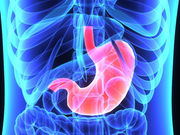Technical success rate of 100 percent in five patients, with no major adverse events observed
WEDNDESDAY, Feb. 15, 2017 (HealthDay News) — For severely obese patients, bariatric embolization is feasible and seems to be well tolerated, according to a study published online Feb. 14 in Radiology.
Clifford R. Weiss, M.D., from the Johns Hopkins University School of Medicine in Baltimore, and colleagues enrolled five severely obese patients with no clinically important comorbidities. Transarterial embolization of the gastric fundus was performed with fluoroscopic guidance.
The researchers found that the technical success rate was 100 percent when the left gastric artery, with or without the gastroepiploic artery, was embolized in all five patients. No major adverse events (AEs) occurred. Two minor AEs were observed: subclinical pancreatitis and a mucosal ulcer, which had healed by the three-month endoscopy. Three patients had a hospital stay of less than 48 hours for routine supportive care. At one and three months, the mean excess weight loss was 5.9 ± 2.4 percent and 9.0 ± 4.1 percent, respectively. At one and three months, the mean change in serum ghrelin was 8.7 ± 34.7 percent and −17.5 ± 29 percent, respectively. At one month the mean changes in serum glucagon-like peptide 1 and peptide YY were 106.6 ± 208.5 percent and 17.8 ± 54.8 percent, respectively. A trend toward improvement in quality of life parameters was noted.
“Further expansion of this study will provide more insight into the long-term safety and efficacy of bariatric embolization,” the authors write.
Several authors disclosed financial ties to medical device and health care companies, including Siemens Healthcare and Merit Medical, which partially funded the study, and Surefire Medical, which also provided material support.
Copyright © 2017 HealthDay. All rights reserved.








